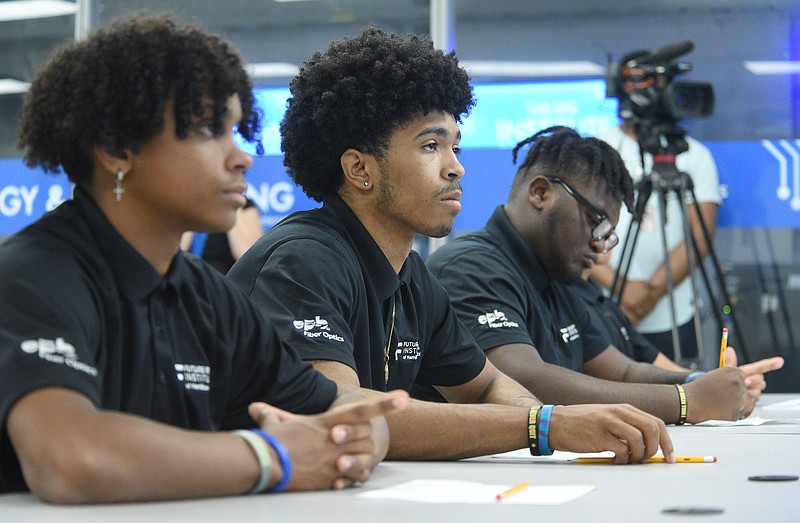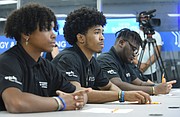Biship Smith remembers as a small boy learning about astronomy and different universes from his grandfather and being intrigued with finding out more about other planets, stars, and light travel and transmissions.
"I'm really interested in quantum theories and hope to someday become an astrophysicist," the Tyner Academy junior said Friday during a presentation on quantum technologies to mark World Quantum Day at the EPB Institute of Technology & Networking. "It seems like a great future."
The backers of a new initiative to promote quantum computing, networks and other technologies in Chattanooga hope they can spur the interest of many more students like Smith in what many see as the next major revolution in communications and computers.
EPB, the city-owned utility that pioneered the nation's first communitywide high-speed internet using its fiber optic network more than a decade ago, says it will soon use its fiber network to begin America's first commercial network to use quantum technologies for businesses to test new ideas and commercial applications. Although still in its infancy, the developers of EPB's new quantum network that launches in July hope the network and other related efforts will put Chattanooga on the leading edge of the next generation of computing, cybersecurity and other technologies.
"This is the kind of initiative that 20 years down the road could fundamentally increase the median income of our entire community," EPB President David Wade said during an interview Friday. "That's how big the possibilities are from this."
NEXT NETWORK
EPB spent $4.5 million to build its quantum network, which was developed by San Diego-based Qubitekk as an outgrowth of cybersecurity research that EPB conducted about the electric grid for the Department of Energy's Oak Ridge National Laboratory.
Duncan Earl, a former Oak Ridge, Tennessee, research physicist who founded Qubitekk and serves as its chief technology officer, said Chattanooga is positioning itself as a unique test bed for some of the new quantum technologies expected in the next revolution of computing and networking.
"This is a revolution in information technology potentially even bigger than what the internet has become," Earl said during an interview after addressing students Friday at both Tyner Academy and Chattanooga State Community College. "Quantum technology allows us to use the physics associated with particles of light to produce computers that are billions of times faster than what we have today."
Earl said during the next decade or two, the advancement in computers and communications made possible by quantum technologies will propel artificial intelligence and change the way we work, communicate and perform many daily tasks.
QUANTUM LEAP
The first quantum revolution nearly a century ago led to the 20th-century technological revolution when transistors and microchips gave us modern-day computers and the internet. Quantum computers use qubits (or quantum bits) or protons, rather than digital bits, and exploit the "multiverse" diffusion of protons to perform calculations much faster than today's computers.
The quantum computing market is just emerging but is projected to top $1.5 billion in revenues by 2027 and to top $4 billion in revenues by 2029, Earl said.
"There will be an employment boom for quantum engineering and field-adjacent specialties," Earl said.
The average pay for a quantum engineer is $125,000 a year, according to the online job site Glassdoor, and Earl said the industry "offers a chance to be a part of something historic."
The jobs in demand go far beyond quantum physicists, although many more of them will be needed. Earl said the emerging industry will need fiber installation technicians, maintenance and support technicians, IT specialists, and quantum component manufacturing workers, as well as engineers, software developers and scientists.
GIG CITY
To help meet the demand for more workers, the Chattanooga initiative known as Gig City Goes Quantum began Friday a series of what organizers say will be more than 1,000 events during the next six weeks designed to introduce, educate and encourage more people to pursue careers related to the emerging technology.
"As our first effort, Gig City Goes Quantum has set the goal of engaging people of all ages," Chattanooga State President Rebecca Ashford said Friday during a kickoff event on World Quantum Day at the Chattanooga State campus. "Having access to the resources of EPB's fiber optic network and EPB quantum network means our students can learn from the best while preparing for the jobs of the future."
While quantum physics is usually taught in upper-level college courses, Chattanooga is introducing the quantum schemes to students as young as fifth grade with play activities on virtual quantum computers.
Earl, who earned his doctorate at the University of Tennessee in physics, taught what he acknowledged was his first high school class Friday at Tyner.
"Our students are learning about cutting-edge innovation that's almost unheard of in high school settings," Tyner Academy Principal Tiffany Earvin said Friday.
NEW PHYSICS, NEW PRODUCTS
Quantum computers use qubits (or quantum bits), rather than digital bytes, to exploit the "multiverse" and perform calculations faster. Qubits are protons or other particles that can be entangled or put into superposition where a single particle can be in multiple realities simultaneously.
Quantum networks like EPB's new quantum network powered by Qubitekk exploit entangled qubits to provide a connection between two particles that cannot be intercepted for improved cybersecurity. Distributing entangled qubits across fibers allows quantum devices to be interconnected to create a quantum network.
WHAT IS QUANTUM NETWORKING?
Traditional networks convey "bytes" of information that are each encoded as a single binary, on/off switch. In contrast, quantum networks utilize entangled particles of light, called qubits, that can be used to perform calculations at paradigm-shifting speeds. Quantum networks can bring the power of quantum computers together to even greater effect than conventional computer networks while also providing an unprecedented level of cybersecurity.
QUANTUM EVENTS AT UTC
The University of Tennessee at Chattanooga is hosting three speeches next week about quantum technology at the UTC Center for Professional Education in the James R. Mapp Building on M.L. King Boulevard. All of the events will begin at noon and are open to the public at no cost as part of the 1,000 events on quantum technologies being held in Chattanooga as part of the Gig City Goes Quantum initiatives.
— On Monday, Oak Ridge National Laboratory Senior Research Scientist Raphael Pooser will discuss quantum computing.
— On Wednesday, James Troupe, chief scientist for the quantum communications company Xairos, will deliver a presentation on quantum networking.
— On Friday, Tian Li, UTC assistant professor of physics, will discuss quantum sensing.
Source: GigCityGoesQuantum.com
WILL QUANTUM NETWORKING CHANGE HOW WE LIVE AND WORK?
Experts project quantum networking will change how people live and work much like the internet did.
— Health care: Model new vaccines and medical treatments in a fraction of the time.
— Finance: Use artificial intelligence and advanced predictive modeling to enhance business competitiveness.
— Education: Create more interactive educational opportunities through photo-realistic virtual reality.
— Safety: Issue warnings before tornadoes, earthquakes, tsunamis and other natural disasters happen.
— Communications: Simultaneously and instantaneously translate multiple languages.
Source: EPB, Qubitekk
Contact Dave Flessner at dflessner@timesfreepress.com or 423-757-6340.

